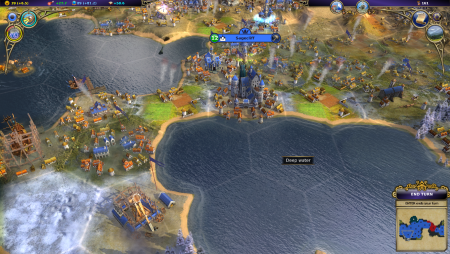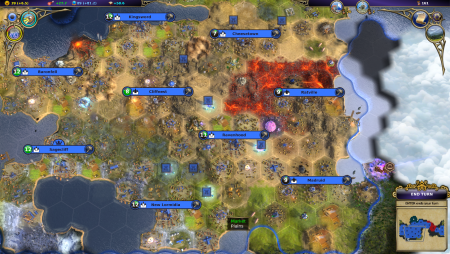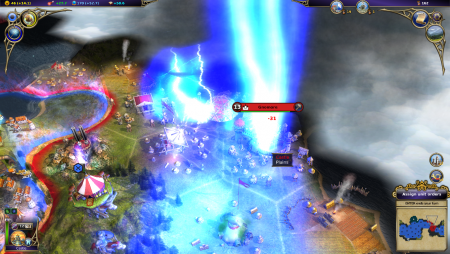Warlock: Master of the Arcane – The Verdict
Okay, let’s get this out of the way first – that bad Sean Connery imitation has to go. I mean, I know Warlock: Master of the Arcane is set in the same fantasy world as Majesty, but I’m starting to hear that voice in my sleep. Then the real Sir Sean appears on the telly and I weep big salty tears for my homeland.
We don’t sound like that, honest to god.
Warlock is an interesting beast. It looks, sounds and smells like Civilization V. It even hangs around the same bars, discussing loudly why hexes are better than squares or triangles, and that diplomacy is way too over-rated. But, digging around under its well-worn jumper, you discover that it has a few bells and whistles that actually give it some semblance of individuality.
The core concept is the same; you pick a Warlock (race), build up your empire while exploring the map, and eventually beat the funny-coloured snot out of all your neighbors. So far, so Firaxis. The game plays out on a hex-board, with the strict insistence that only a single unit can inhabit a hex, and forces you to use your initially stunted unit count far more cleverly than you actually will.
As the game progresses, you can conquer other cities and gain access to more powerful units. And they all fall under the purview of “comedy-fantasy”. A personal favourite of mine are the “Stubborn Knights” – Knightly chaps riding donkeys whose info spiel sounds right out of a Monty Python movie. If this is already making your teeth itch, you should probably stick to Civilization 5 – the humour is wide-spread and a little hit and miss. And with that horrible faux-Scottish chap nattering every other turn, it may induce an ulcer.
That would be a shame, however, as Warlock’s aforementioned bells and whistles are surprisingly shiny and pleasing to the ear. Dig a little deeper in the warlock/race selection screen, and you will notice a few additions to the usual Civ fare, including a fully customisable perk system that allows you to create a rather unique starting point (and warlock) for any game. Your warlock isn’t just a face to be used at the negotiation tables either; he/she/it starts with spells that you can cast anywhere, any-when (provided you have the mana). Not only that, during the course of the game you can learn some world-breaking abilities – from calling down a firestorm on entrenched enemies, to boosting a cities food-harvest to belly-busting levels. There are a number of enchantment spells you can cast on your units too, from resistance boosting shields to weapon enchantments, or even the occasional healing spell.
The best bit of all this magical interference? Your rival AI-warlocks can do it too. Games can be won by simple unit-attrition, but when the bad guy can drop a thunderstorm on your army, you may have to get creative. This follows through well with the surprisingly effective enemy-AI; it will retreat if outnumbered or out-classed, it prioritizes and attacks cleverly, and tends to be irritatingly accurate with it’s own brand of magic. I’ve lost entire armies to unexpected and devastating moves during the AI’s turn. During one of my games, I ended up with an entire enemy army marching through my territory as my own battered ineffectively at an enemy stronghold miles away – the cheeky bugger had snuck them around by sea, avoiding my line-of-sight, and landed on an undefended expanse between my cities.
Needless to say, this was not expected.
Another lovely touch is the experience system attached to units. As your units fights and defends, they accumulate XP and level up. Normally in this type of game the benefits are marginal – small defense and attack boosts etc. In Warlock, each level allows you to bestow some mighty perks on your units, and they can turn from an uninspiring weakling into a mobile death-dealing monstrosity that is basically invincible. Again, this sounds more game-breaking than it is – your opponents units do the same. But when you can take a Halberdier unit – an uninteresting melee fighter – and boost its defense through the roof with a few perks, and then use a “vampiric weapons” enchantment on it, therefore turning it into a tank that absorbs health with every strike… Put it this way: that enemy army I mentioned before, the one that sneaked into my territory? These souped-up Halberdiers basically ate them.
All of them.
A shame then that, despite Warlock’s ruthless and clever combat AI, the diplomacy boils down to periodic threats for gold, and the only options available are “pay” or “war”. There are a few other routes for non-combat diplomacy, non-aggression pacts, trade etc. But it costs so much in the long run, you might as well just go to war. The various other warlocks even have a “this much away from declaring war” bar that will empty slowly if you don’t keep giving them gold or mana. I suppose this fits in with the Terry Pratchett mentality of wizards and warlocks – give two a rope and they will instinctively pull in opposite directions. But for a game built as a 4X strategy – there really isn’t a lot of eXploitation opportunities. Not that war is a major issue, the combat is lively, well animated and interesting; it would just have been nice to have some diplomatic options to balance things out.
Warlock: Master of the Arcane doesn’t try to reinvent the genre. It simply tries to polish the silverware, and push for a more action-focused turn-based strategy that feels fun. It tries very hard to avoid resorting to the maddening end-game attrition that plagues most other 4X games, and it almost succeeds. The world-map itself is gorgeous; all rolling pastures and fantastical creatures to build on and kill, respectively. It even goes as far as to offer you different worlds to mess with – other dimensions you can send units to and colonize, assuming you can beat the frankly nightmarish creatures that lurk there. Yes, it has all the hallmarks of old Sid’s masterwork, but it carries enough unique quirks to keep you interested long into the quiet night.
One more turn? Yes please.
Verdict: On target
Platforms Available/Reviewed – PC
For more information on our scoring system, please head here.


